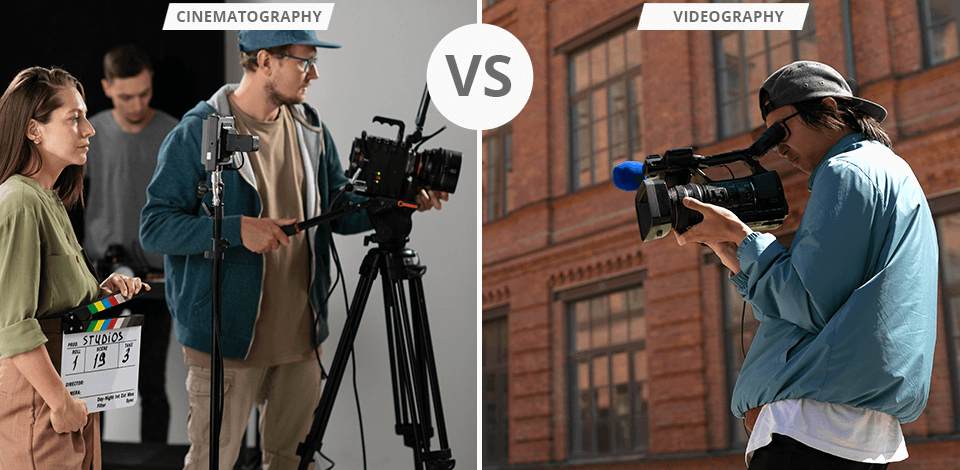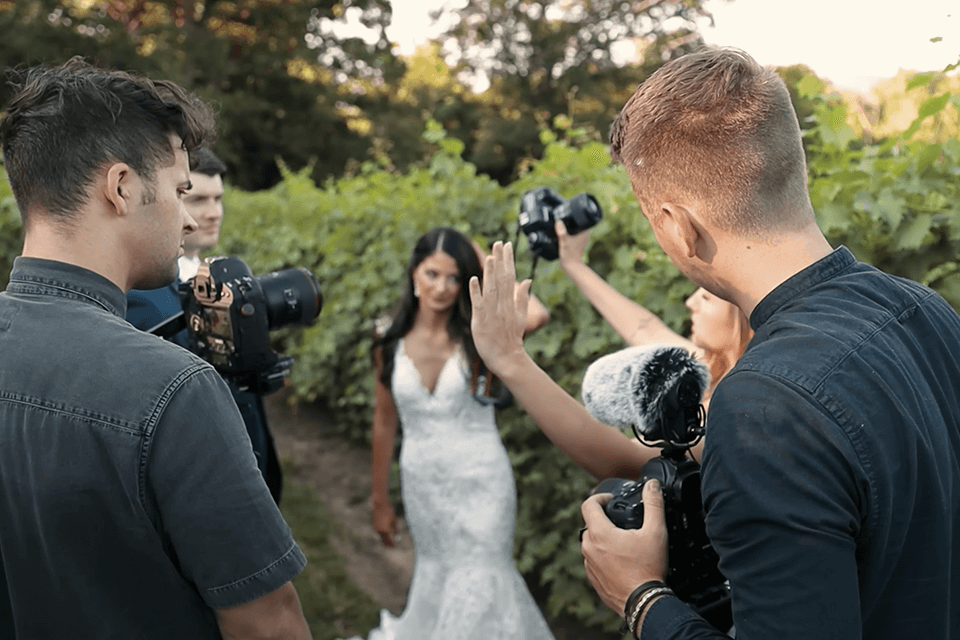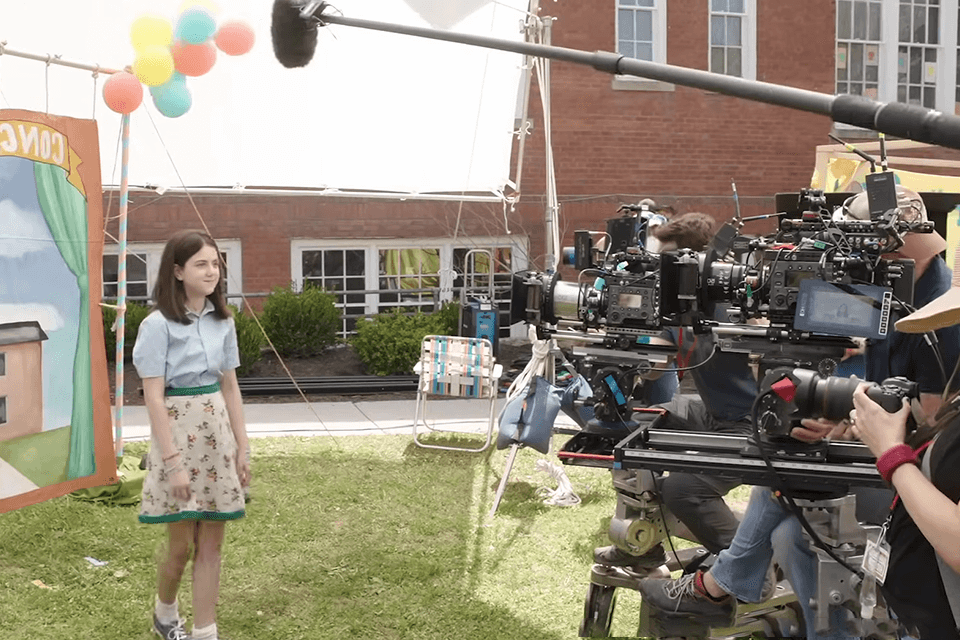
As a videographer with over 10 years of experience, I am sometimes asked to work as a cinematographer. I refuse such requests as these approaches are quite different.
Even though these approaches involve shooting footage, they differ when it comes to angles, methods, and implementation. But both terms are important for cinema production. Each of them allows creative specialists to tell unique visual stories.

✔️ Quick turnaround (within hours or days after an event)
✔️ Low budget (the price for wedding videography services may range from $1,000 to $3,000)
✔️ Capturing emotions and memorable moments
✔️ It will suffice to use budget equipment
❌ Limited planning
❌ A videographer may miss some moments
Videography professionals either work alone or with a small team. They capture events as they unfold and have the necessary set of tools allowing them to work on a variety of projects, from weddings to other types of events.
If you compare cinematography vs videography, you will see that the latter is more suitable for capturing weddings. Videography is all about capturing spontaneous moments, which makes it a great choice for those who want to document special occasions. Some videographers know how to make a viral video that will be watched by hundreds of people on the Internet.
|
Project Types |
Wedding videos, live events, promotional clips, documentaries, corporate films
|
|
Essential Gear |
DSLR or mirrorless cameras, video tripods, lighting, microphones, extra batteries |
|
Key Skills
|
Camera handling, editing software proficiency, creativity, adaptability, directing, client communication
|

✔️ Extensive planning and pre-production
✔️ Focus on a visual narrative and storytelling
✔️ Ability to use professional techniques (lighting, angles)
✔️ Collaboration with directors and other professionals
❌ Higher budget (typically $5,000 and up for films)
❌ More professional equipment and setups
Cinematography involves close collaboration between directors, production designers, and other filmmakers. The difference lies in the fact that cinematographers prioritize weaving a powerful visual narrative that makes the storytelling aspect of a video project stronger.
Working as a cinematographer requires extensive planning, artistic vision, and mastering filmmaking techniques. Such professionals create high-quality projects that have a noticeable visual impact.
|
Project Types
|
Feature films, short films, commercials, music videos, documentaries
|
|
Essential Gear
|
High-end video cameras, tripods, gimbals, and steadicams, professional lighting equipment, high-quality lenses, audio equipment (for sync sound), monitors and recording devices |
|
Key Skills
|
Advanced camera operation, cinematic composition, lighting techniques, color grading, collaboration, technical problem-solving
|

| Videography | Cinematography | |
|---|---|---|
|
Focus on Live Events
|
✔️ |
❌ |
|
Small Teams or Solo Operation
|
✔️ |
❌ |
|
Artistic Planning Required
|
❌ |
✔️ |
|
In-Depth Pre-Production Planning |
❌ |
✔️ |
|
Requires Large Production Crew |
❌ |
✔️ |
|
Quick Decision Making
|
✔️ |
❌ |
|
Leadership Skills Important |
✔️ |
✔️ |
|
Post-Production Knowledge Needed
|
✔️ |
✔️ |
|
Creative Direction Involvement
|
❌ |
✔️ |
|
Technical Knowledge of Equipment
|
✔️ |
✔️ |
|
Types of Projects
|
Live events, weddings, corporate videos
|
Films, music videos, documentaries
|

Using these professionally-designed LUTs, you can quickly enhance your footage to give it a cinematic look. They are suitable for all types of videography projects and films. You can quickly apply them in Adobe Premiere Pro and similar software. After downloading these LUTs, apply them to your footage to perform color grading with a few clicks.
The key difference lies in the main methods and objectives. Traditional videography is all about shooting live events without significant preparation, while cinematography requires a more creative approach and attention to visual narratives. Cinematographers need to plan the post-production stage carefully and collaborate with other specialists.
It’s typical to use videography for weddings and other live events. Videographers are often hired to capture concerts and conferences, promos, short documentary videos, and corporate videos. They often utilize budget filmmaking cameras. Their extensive skillsets enable them to use various settings and cater to the needs of their clientele.
Essential videography equipment includes a camera (DSLR, mirrorless, or camcorder), a tripod or stabilizer, lighting equipment, external mics, extra batteries, and memory cards. Equipped with this gear, videographers can perform their work without any interruptions and create high-quality footage.
Cinematographers must master advanced camera operation skills and learn in-depth about cinematic composition, lighting techniques, and color grading. They should know how to collaborate with other professionals and solve technical issues. An extensive set of skills is necessary for creating engaging visuals.
Videography budgets can be different for various types of events. When it comes to weddings, one is expected to pay from $1,000 to $3,000 for such services. The cost of a specific project depends on the complexity of the task, the duration of shooting, and the number of tasks that should be performed at the post-production stage. Videographers typically use only licensed video editing software for Windows and Mac, due to which their services could be quite expensive.
Yes, many specialists in the industry know the essentials of both videography and cinematography. However, fully dedicating yourself to one of these approaches requires mastering complex techniques. Even if a person is an expert in one approach, it does not mean that they will be able to handle the tasks they do not specialize in.
The turnaround time depends on the scope of operations and the complexity of the workflow. Drone videography may be time-consuming, as a professional has to dedicate a lot of time to preparation and post-processing. In most cases, clients receive the output files within a few days or weeks after the footage was shot.
Cinematographers typically create feature films, ads, short films, music clips, and documentaries. When working on such projects, they focus on telling an engaging story using specific visual aesthetics. These professionals often work as a part of a team that also includes directors and other specialists.